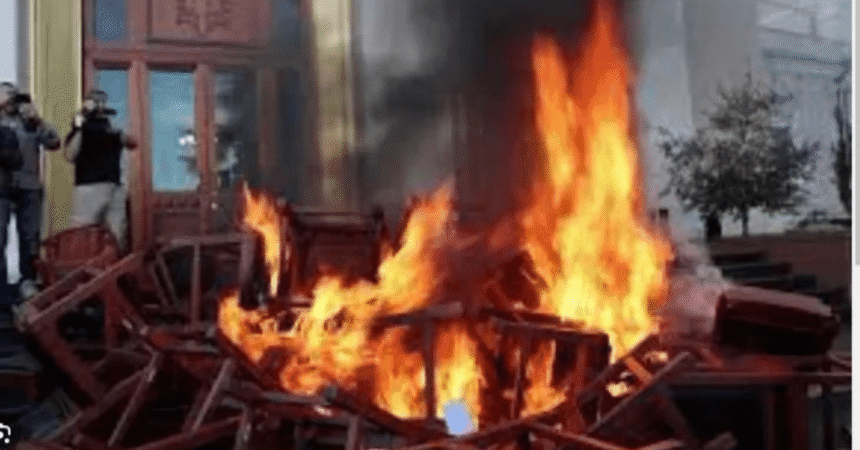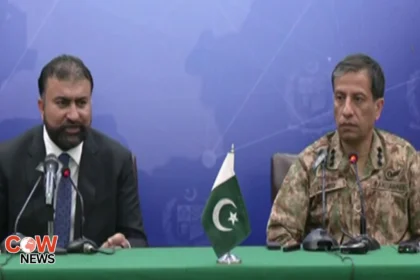In a dramatic display of dissent, the Albanian opposition has staged a protest outside parliament, culminating in the burning of chairs. This act of defiance underscores the mounting political tensions in the country, primarily fueled by a recent court ruling that opposition leaders claim is a politically motivated attack orchestrated by Prime Minister Edi Rama. The ongoing turmoil has raised significant questions about the state of democracy in Albania as the nation approaches parliamentary elections next year.
Background of the Protests
The backdrop of this political upheaval can be traced to a series of judicial rulings that have drawn ire from the opposition. The Democratic Party, led by former Prime Minister Sali Berisha, has accused Rama of employing the judiciary as a tool of political repression. On Sunday, Berisha called the court’s decision a “blind act of revenge and political terror against the Democratic Party,” suggesting that the ruling was intended to undermine his party’s legitimacy and further consolidate the ruling government’s power.
Gazmend Bardhi, the head of the Democratic Party’s parliamentary group, emphasized the party’s resolve to fight against what they perceive as authoritarianism. “We will continue our battle against Rama, who is solely responsible for this situation,” he stated, voicing the frustrations of many Albanian citizens who feel disenfranchised by the current government.
The protests reflect broader societal discontent regarding the government’s handling of various issues, including corruption, economic challenges, and perceived erosion of democratic norms. As the opposition mobilizes its supporters, tensions are likely to escalate, raising concerns about public safety and political stability in the country.
The Role of the Judiciary
The judiciary in Albania has long been a contentious issue, with allegations of political influence and corruption undermining its credibility. The recent court ruling that sparked the protests is seen by many as a symptom of a deeper malaise within the judicial system. Critics argue that the government has exerted undue pressure on judges and prosecutors to secure favorable outcomes for political allies while targeting opponents.
This dynamic has fostered an environment where the opposition feels it has little recourse to challenge the government’s actions. The Democratic Party has characterized the judicial system as a weapon used by Rama to silence dissent and eliminate political competition. Berisha’s ongoing house arrest on charges of “passive corruption” has only intensified these claims, with the former prime minister asserting that the charges are baseless and politically motivated.
Public Sentiment and Mobilization
The opposition’s call for a national rally on October 7 is a pivotal moment for Albanian politics. Organizers have urged citizens to take to the streets, promising to block roads and disrupt daily life as a form of protest against Rama’s government. The rhetoric surrounding the protests has become increasingly charged, with Berisha declaring, “The battle of October 7 will be the battle of our lives.” This statement encapsulates the high stakes involved for both the opposition and the ruling party as they prepare for a showdown.
Public sentiment is decidedly mixed. Many Albanians are frustrated with the current administration, citing rising living costs, economic stagnation, and pervasive corruption as pressing concerns. The opposition has seized on this discontent, framing their protests as a necessary response to what they describe as Rama’s authoritarian rule.
However, there are also segments of the population that support Rama, viewing his government as a stabilizing force amidst a tumultuous political landscape. This division poses a challenge for the opposition, which must not only mobilize its base but also persuade undecided voters to join their cause.
The Political Landscape Ahead of Elections
As the protests loom, the political landscape in Albania is fraught with uncertainty. Parliamentary elections are scheduled for next year, and both the ruling party and the opposition are keenly aware of the stakes involved. For Rama, maintaining power means not only weathering the current protests but also ensuring that his government remains viable in the eyes of the electorate.
The opposition, on the other hand, is seeking to capitalize on the unrest to galvanize support ahead of the elections. Berisha’s leadership has been critical in this regard, as he aims to unify various factions within the Democratic Party and present a cohesive front against the ruling government. However, internal divisions within the opposition could undermine their efforts, making it crucial for them to present a united and compelling alternative to Rama’s administration.
Government Response to Protests
In response to the mounting protests, Prime Minister Rama has taken a defiant stance. He praised the court’s ruling as a necessary measure to uphold justice, dismissing the opposition’s claims of political persecution. His government has characterized the protests as an attempt by the opposition to destabilize the country and distract from their own failures.
Rama’s rhetoric has served to polarize the political environment further, with both sides entrenched in their positions. This dynamic raises concerns about potential violence as tensions escalate, particularly if protesters clash with law enforcement. The government’s response to the protests will be critical in determining whether the situation devolves into chaos or whether a path towards dialogue and resolution can be found.
International Observations and Concerns
The political turmoil in Albania has not gone unnoticed by the international community. Observers have expressed concern regarding the potential for violence and instability in a country that has been striving to solidify its democratic institutions. The European Union, in particular, has emphasized the importance of upholding the rule of law and ensuring free and fair elections in its communications with the Albanian government.
The EU has long viewed Albania as a potential candidate for membership, but the path to accession remains fraught with challenges, particularly related to governance and the rule of law. The current political crisis could impact Albania’s aspirations for EU integration, as the bloc closely monitors the government’s actions in response to the protests and the treatment of opposition figures.
Implications for Democracy in Albania
The ongoing protests and the government’s response will have significant implications for the state of democracy in Albania. If the opposition can successfully mobilize large numbers of citizens and maintain pressure on the government, it could force Rama to reconsider his approach to governance. Conversely, if the government responds with heavy-handed tactics, it may further alienate the public and exacerbate the political crisis.
The current situation also raises broader questions about the health of democratic institutions in Albania. The judiciary’s independence, the role of civil society, and the functioning of political parties will all be tested in the coming months. For democracy to flourish, it is essential for all stakeholders to engage in constructive dialogue and work towards a resolution that respects the rights of citizens and upholds the rule of law.
The Future of the Opposition
The Democratic Party faces its own set of challenges as it seeks to capitalize on the current unrest. Internal divisions, leadership dynamics, and strategic decision-making will all play a crucial role in determining the opposition’s effectiveness in the coming months. Berisha’s leadership has been a focal point, but there are voices within the party calling for a new generation of leaders to emerge and bring fresh perspectives to the political landscape.
As the October 7 protests approach, the opposition must focus on unity and clarity of message to attract a broad coalition of support. They will need to articulate a compelling vision for Albania’s future that resonates with citizens’ concerns, particularly around issues of governance, corruption, and economic stability.
The Path Ahead
As Albania braces for protests and political confrontation, the coming weeks will be critical in shaping the country’s future. The opposition’s ability to mobilize public support and the government’s response to dissent will determine the trajectory of Albanian politics in the lead-up to the elections.
Both sides face challenges that could redefine their roles in the political arena. For the opposition, success will hinge on unity and effective messaging; for the government, maintaining power while navigating public discontent will require careful strategy. The unfolding situation in Albania serves as a reminder of the delicate balance between governance, dissent, and the will of the people in a functioning democracy.
The outcome of this political struggle will have lasting implications not only for Albania’s immediate future but also for its aspirations on the European stage. As citizens prepare for the October 7 protests, they carry with them hopes for change, accountability, and a more democratic society.
#Albania #PoliticalProtests #DemocraticParty #EdiRama #SaliBerisha #Judiciary #Corruption #Elections2024 #CivilRights







